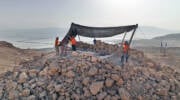The media’s job is to report the facts. Readers of the Associated Press and Agence France-Presse deserve to know the full picture.
By Gidon Ben-Zvi, Honest Reporting
The Israeli cabinet on December 26 approved a $300-plus million development plan for the Golan Heights. The initiative seeks to double the population of the northernmost part of the country to some 100,000, replete with new communities along with infrastructure and transportation upgrades.
The Associated Press (AP) subsequently portrayed the Israeli government’s move as a blow to peace:
Entrenching Israeli control over the territory would complicate any future attempt to forge peace with Syria, which claims the Golan Heights.”
Agence France-Presse (AFP), another leading wire service, seemed to delegitimize the presence of Jews, specifically, in the region:
“It [the proposal] calls for 1 billion Israeli shekels to be spent on housing, infrastructure and other projects with the goal of attracting roughly 23,000 new Jewish settlers to the area…”
Syria Part of Anti-Israel ‘Axis of Resistance’
The timing of the Israeli government’s decision to approve the Golan Heights plan coincides with the Islamic Republic’s growing machinations in Syria, foremost efforts to revitalize a regional alliance known as the ‘Axis of Resistance.’ Some experts maintain that Tehran is pushing to enhance ties with its Mideast terrorist proxies in response to the recent agreements between Israel and several Arab countries to normalize relations.
In December 2020, former Iranian president Hassan Rouhani said that Tehran and Damascus share a common goal of destroying Israel:
The Islamic Republic of Iran will continue its support to the Syrian government and people as our strategic ally and we will stand by Syria until its final victory… [contronting] Zionist occupiers and terrorism is the joint goal of both nations.”
Yet the Associated Press piece completely decontextualizes the role of the Syrian government in fomenting violence on Israel’s northern border. Since the start of the civil war in Syria over a decade ago, the Israel Defense Forces (IDF) have been forced to launch hundreds of strikes against military assets in response to moves by Iran to establish a permanent foothold in the country, and efforts to transport advanced weapons to terrorist groups such as Lebanon-based Hezbollah.
As such, many analysts have construed the Jewish state’s retaliatory measures as a two-fold message: First, that Israel will never allow Iran to create forward-operating bases along its frontier and, second, that Jerusalem holds Damascus responsible for facilitating Tehran’s ambition to destroy the Jewish state.
By depicting the Israeli government’s recent decision vis a vis the Golan heights as “complicating any future attempt to forge peace with Syria,” the Associated Press blithely ignores the primary catalyst for ongoing instability: the Islamic Republic of Iran.
Should Israel Make Peace With a War Criminal?
With regards to the development plan, Israeli Prime Minister Naftali Bennett said: “Every knowledgeable person in the world understands that it is preferable to have Israeli heights that are quiet, flourishing and green as opposed to the alternative.”
One can reasonably deduce the most likely alternative.
In September, United Nations High Commissioner Michelle Bachelet made clear that the conflict in Syria had killed more than 350,000 people, while noting that this figure was an “under-count of the actual number of killings.”
Bashar al-Assad’s regime has used chemical weapons more than 300 times, according to an investigation by the Global Public Policy Institute. In all, approximately 12 million Syrians have been forced from their homes.
Somehow, these details failed to make it into the reporting on how Israel is coping with a hostile neighbor to its north.
A ‘Problem’ With Jews Living in the Golan
While the AP misses the mark when it comes to providing crucial context about current geopolitical realities, AFP goes as far as implying that the Israeli government’s plan for the Golan Heights is an exercise in state-sanctioned racial discrimination:
Israel’s government on Sunday approved a $317 million plan to double the Jewish settler population in the Golan Heights…” [emphasis added]
First off, the government plan is to increase the number of all Israelis living in the Golan Heights: Jews, Christians, Muslims, etc. For Israelis seeking employment opportunities, the initiative will create 2,000 jobs and turn the Golan Heights into Israel’s renewable energy capital.
Moreover, the actual demographic composition of the region is worth elaborating on. Currently, some 53,000 people live in the Golan Heights: 27,000 Jews, 24,000 Druze, and some 2,000 Alawites (an ethnoreligious group originating from Shia Islam).
That AFP focuses uniquely on the prospect that additional Jews will move to the region is therefore troubling.
Media Pushing Israel as Land-Grabber Myth
The Associated Press and AFP have effectively transformed Jerusalem’s decision to invest in the development and security of its citizenry into a false portrayal of Israel as some sort of “land-grabber.”
In reality, the Israeli government is doing what all governments are meant to do: that is, ensure the well being of all citizens, irrespective of background; this, in stark contrast to the 19-year period ending in 1967 when successive Syrian regimes failed to invest in local infrastructure and services.
Under Israeli control, electricity and water systems, as well as agricultural facilities and health clinics, were put in place.
With regards to the legal status of the Golan Heights, AP, AFP and other outlets refer to it as ‘captured’ territory. But the reality is more complex. As an outcome of the Syrian attack on Israel in the 1967 Six-Day War, Israel assumed control over parts of the Golan Heights. The Israeli-Syrian Agreement on Disengagement of 1974 established a buffer zone between them and a United Nations Observer Force to supervise its implementation.
Israeli law was applied by the Knesset to the Golan Heights on December 14, 1981.
In 2019, then-US president Donald Trump acknowledged the strategic importance of the region to the Jewish state when he recognized Israeli sovereignty in the Golan.
The media’s job is to report the facts of a story. Readers of the Associated Press and Agence France-Presse deserve to know the full picture.























